
There is a huge presence of expats in the United Arab Emirates. Of a total headcount of 9.9 million Dubai inhabitants, only 1.15 million are Emiratis, according to the Global Media Insight 2021. Most expats in the UAE are from India (27%) and Pakistan (13%), but the country has a big British community as well.
UAE contains one of the most advanced and modern cities to work with highly connected transport facilities, constant development, and strong economic growth. All these points make the nation a hub of employment opportunities for expats, who are also drawn there as a result of the tax-free lifestyle despite the high cost of living.
Business demands in the UAE have been increasing in the second semester of 2021 as a growing number of international investors and expats are again looking to move to the nation as restrictions ease further. In addition, the UAE has won international recognition for its pandemic strategy, with Abu Dhabi topping a new global ranking of 50 cities for their Covid-19 response, Dubai placed fifth.
UAE companies are back to office, and citizens of all countries can visit the region for tourism and apply for working visas. Those who are not fully vaccinated with one of the WHO-approved COVID-19 vaccines must undergo a rapid PCR test at the airport on arrival. Recruiters in Dubai have seen a 20 per cent increase in inquiries of expats looking to move from Singapore and Hong Kong, for example, where coronavirus restrictions are still stricter. The economy in the UAE is trying to boost again to pre-pandemic levels and consequently to their expats demand. The Air company Emirates mentioned it will be back to pre-covid levels in 2025. On the other hand, one of its strategies is that the staff: pilots, engineers and flight crew who are predominantly coming from Europe and North America, will be based in the UAE.
The relation between expats and UAE is reciprocal, it is not only a place in the expats' mind, but the country also looks for them, as they have 6 broad types of visa and entry permits. It includes Tourist/Visit Visa, Medical Entry permit, E-Visa for Gulf Cooperation Council residents, Transit Visa, Student Visa, and Retirement Visa for Residents. The new movers in the country are mixed in terms of background, as the visa process is much easier than in other Asian and European countries. For instance, the UAE government permits expatriates in privately held companies to enter the nation and stay for two months until their employer finalizes their residence permit, which would be valid for two years or one year, depending on the contract.
What is attracting expats?
With consistently advancing employment opportunities and a high technology level, UAE has become a desired destination for expats to live and work. They come from all over the world to have a good lifestyle and high paying jobs. Thanks to professional assistance in UAE employment, visa stamping, foreigners easily complete the visa acquisition process and move forward with their goals. Additionally, expats are drawn to the UAE also to retire. Since 2008, people over the age of 55 can get a long-term residence visa for a period of 5 years.
Another reason for expats moving to the UAE is the economic crisis, aggravated due to the pandemic. Many expats from most affected countries are seeking opportunities in the UAE like India and South Africa, which for example seem to have expats interested in the market. Besides, South Africans can now, for the first time in a long-time, travel direct to the UAE. Therefore, the busier those flights become, the more it will be a fact-finding that they would like to move to the nation. However, in Britain's case, their presence may be, in part, due to the recent trade agreements between the UAE and the UK, as both countries share an important trade and investment relationship. There was a total trade of £18.6bn in 2019 and a two-way investment of £13.4bn in 2019, promoting innovation, jobs, and economic development for both countries.
Expats expectations
The return of the economy to pre-COVID levels, as well as the demand for expats, can also mean that there is a great chance of competition on the horizon between firms already based in the country. This internal competition can make it more difficult for new companies to gain licenses due to the new rules established for regulating the market. The new norms appear to only want companies that are well-backed and well-resourced. As such, according to local specialists, expats as workers and investors should consider more mergers across the UAE rather than establishing more new firms.
Expatriates looking for work in the UAE market should also have in mind what sorts of business are less common in order to avoid this competition and regulations for opening a new company. The high employment rate has attracted a wide range of workforce which shares a diverse culture in the UAE, but the most common job areas tend to be around: sales, accounting and finance, engineering, real estate/ property consultants and legal advisers.



















